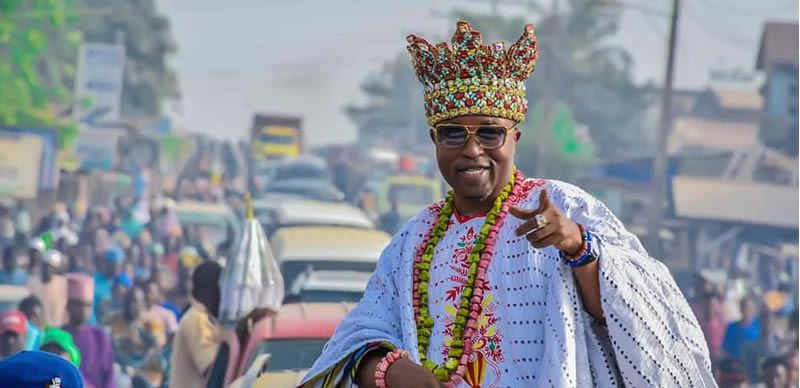During the recent commissioning ceremony of the 34.85 km Oyo-Iseyin Road and the Ladoke Akintola University of Technology, Iseyin Campus, an incident involving derogatory remarks towards the traditional rulers unfolded.
Former President Olusegun Obasanjo, addressing the gathering in Yoruba, directed the traditional rulers present to rise and extend their greetings to the incumbent Governor of the state, Seyi Makinde.
“Rise! Take your seats!” Obasanjo commanded the rulers with a firm tone in Yoruba language.
Numerous individuals have criticised and condemned the former president for what they perceive as a disgraceful lack of respect towards the revered traditional custodians known as Oba or Kabiesi in Western Nigeria.
However, according to a reportby Premium Times, Obasanjo defended his actions by expressing his dismay at the lack of respect shown by the monarchs during the event.
“As far as I am concerned, there is the constitution, and there is culture. By our constitution, the governor is the leader of a state. Everyone must respect him no matter his or her status or age. He deserves respect no matter how young he is, and protocols must be observed.”
However, this incident raised the question about the place of traditional institutions in Nigeria’s modern democracy and whether the institution, considered the closest to the people, deserves the disrespect many say it currently receives.
Before the Colonial Masters
Before the arrival of colonial masters in Nigeria, traditional leaders played a crucial role in governing various ethnic groups and communities across the region. Traditional rulers held authority and were central figures in the socio-political structures of their respective societies.
These leaders fulfilled various crucial roles, encompassing judicial, political, economic, and even religious powers. They acted as the backbone of governance, ensuring justice, making political decisions, managing economic resources, and safeguarding the rich social and cultural heritage of their people.
Not until the spell of colonisation did a shift occur that altered the role of traditional rulers.
Since then, Nigeria has built a history of political power holders extending their authority to the traditional scene, containing from where the colonial masters stopped. During the tenure of the late Military Head of State, Abacha, when the Sultan of Sokoto was dethroned. Another case took place when the former governor of Kano and current APC National Chairman, Ganduje, removed the then Emir, Sanusi, from office. Additionally, the former governor of Ondo State, Mimiko, enacted a ban on the then Deji of Akure.
There are many examples like that, even of political officeholders dragging occupants of traditional offices into political battles.
Experts offer diverse perspectives on this issue, examining it from various angles.
Kehinde Ayanboade, the director of Naija Metro News, a media platform dedicated to the preservation of Yoruba culture, emphasised that it is crucial to recognise that the origin of the ridicule faced by Nigerian monarchs can be traced back to the colonial masters. In his perspective, during the colonial era, traditional rulers began to experience a decline in their authority and influence, marking a pivotal shift in the dynamics of power and respect within Nigerian society.
“Because they introduced the indirect rule, that makes the kings the paramount ruler but still subjects them under the rulership of the government of the state. “
He added, “It is not possible for the monarchs to do anything except the government is aware and agrees. Their power has been subdued so much that even the local government chairman can have the right to override them. They are just ceremonial rulers now with no executive power.“, Kehinde said.
Kehinde also highlighted that since the government pays the salaries of the monarchs, the principle holds that whoever pays you holds authority over you, placing the monarchs in a subordinate position to these paymasters.
“The culture won’t prosper because the custodians are underutilised and not actively engaged in governance issues, “ he said.
Another expert pointed out that the fundamental issue stems from our Constitution, which does not provide traditional rulers with constitutional functions within government offices.
Sam Olorunfemi Jr., a Public Affairs Analyst, asserted that elected councillors hold constitutional roles and enjoy greater recognition within our constitution compared to any esteemed traditional ruler.
“The traditional institutions in Nigeria are under the discretion of the state governments across the federating units, which is the reason why before a traditional ruler comes to office, the “staff of office” must be presented to him by the State Government, under the State Ministry of Local Government and Chieftaincy Affairs.”
Nevertheless, both experts opined that the manner in which Obasanjo corrected the monarchs was deemed excessively harsh.
For the restoration of lost glory, People are demanding change and a revival of respect for tradition and their traditional leaders.
Following the inauguration of President Bola Tinubu as the 16th democratically elected President of the Federal Republic of Nigeria, Oba Oluwo took a proactive stance by advocating for constitutional amendments that would grant significant recognition and roles to traditional institutions in Nigeria. Under this proposed change, there would even be a designated Minister of Traditional Rulers in Nigeria.
During the commissioning ceremony of the 34.85 km Oyo-Iseyin Road and the Ladoke Akintola University of Technology, Iseyin Campus, an incident occurred involving former President Olusegun Obasanjo making derogatory remarks towards traditional rulers. Obasanjo instructed the monarchs to stand and greet Governor Seyi Makinde, leading to widespread criticism for disrespecting these cultural custodians.
Obasanjo defended his actions by highlighting the need for respect towards the governor, as mandated by the constitution. This incident raised questions about the role and respect of traditional institutions in Nigeria's modern democracy. Historically, traditional rulers held significant power until colonial rule diminished their authority, relegating them to more ceremonial roles under government control.
Experts noted that the reduction of monarchs' power began during colonization, asserting they are now subject to government authority. They argued that the lack of constitutional functions for traditional rulers and governmental financial control has weakened their influence. While Obasanjo's manner of rebuke was deemed harsh, there is a call for restoring respect and significant roles for traditional leaders.
In light of President Bola Tinubu's inauguration, there are proposals for constitutional amendments to recognize and empower traditional institutions, including the appointment of a Minister of Traditional Rulers in Nigeria.






